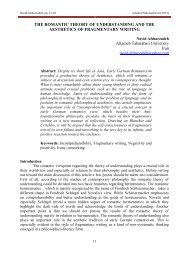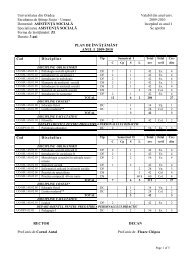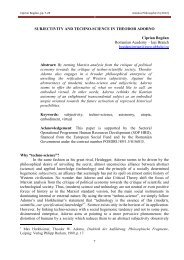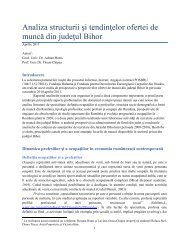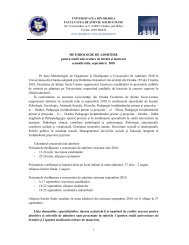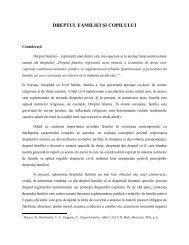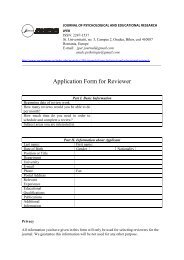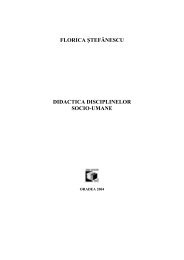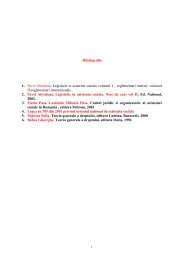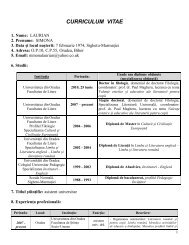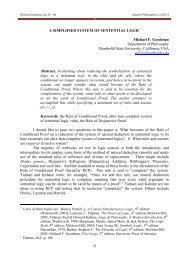Stephan Käufer: HEIDEGGER ON MINENESS AND MEMORY
Stephan Käufer: HEIDEGGER ON MINENESS AND MEMORY
Stephan Käufer: HEIDEGGER ON MINENESS AND MEMORY
Create successful ePaper yourself
Turn your PDF publications into a flip-book with our unique Google optimized e-Paper software.
Annales Philosophici 2 (2011) <strong>Stephan</strong> <strong>Käufer</strong>, pp. 51 - 65<br />
It remains a riddle, how this happening as fate is supposed to<br />
constitute the whole ―connectedness‖ of Dasein from birth to death<br />
(SZ, p. 387). 1<br />
Part of the question is about what ―holds Dasein together‖ and the answer to this lies<br />
in Heidegger‘s existential notion of the self, as a unity implicit in the care-structure. With this<br />
existential notion, i.e. with an account of the self as disposed ability, Heidegger argues against<br />
interpretations of life, according to which human life is a ―sum total of momentary realities of<br />
successively arriving and disappearing experiences‖ (SZ, p. 374) and the self is something<br />
that unifies this totality of ―time-slices.‖ This general criticism covers a range of views of the<br />
self: Kant‘s transcendental apperception, Locke‘s psychological continuity, and several views<br />
from Husserl. It can also be used to address more recent analyses of the self that emphasize<br />
the role of episodic memory in constituting the self by connecting together diachronically<br />
distinct experiences. 2 In particular, it puts Heidegger fundamentally at odds with the<br />
groundbreaking views on the self and subjectivity developed by Shawn Gallagher and Dan<br />
Zahavi, who draw on the resources of both phenomenology and current cognitive science. 3<br />
For Heidegger the question about connectedness is not primarily about consciousness,<br />
or even unconscious experiences. This is a fundamental difference between Heidegger and<br />
the approach to the persistence of the self over time in Husserl, Gallagher, Zahavi and most of<br />
the contemporary literature. 4 Because Heidegger does not think that consciousness is directly<br />
relevant to the continuity or unity of Dasein over time, he almost never mentions memory as<br />
such. Of course he uses a lot of temporal language and concepts that have to do with memory<br />
in some way: Gegenwärtigen, Wiederholen, Gewesen, Geschichte, and Vergessen. He uses<br />
Erinnerung twice in the temporality chapter, to point out that temporality is not about<br />
memory. So, the temporality of anxiety, i.e. the way it brings you back to your thrownness, is<br />
not a kind of remembering: ―This bringing back does not have the character of a forgetful<br />
avoiding, nor of remembering‖ (SZ, p. 343). And in discussing the temporality of<br />
1 All translations from Heidegger in this paper are my own. Page references throughout are to the<br />
German editions of Sein und Zeit and the Gesamtausgabe.<br />
2 For the most parts such views follow in the general footsteps of Locke‘s ontology, and there is a big<br />
variety of them. An extreme form is the conception of the self as a narrative, which can<br />
be found in Ricoeur, MacIntyre, the psychologist Dan McAdams, maybe Dennett, and<br />
Velleman. What you are, and what unifies your time-slices, is a narrative that you spin,<br />
with the help of your community and culture, over the course of your life. Constructing<br />
such a narrative depends on your ability to recollect and reinterpret past episodes of your<br />
life.<br />
3 See especially Zahavi, D. Subjectivity and Selfhood: Investigating the First-Person Perspective,<br />
Cambridge: MIT Press, 2005; and Gallagher, S. and D. Zahavi, The Phenomenological<br />
Mind, London: Routledge, 2008.<br />
4 Consider what Heidegger says about moods in Fundamental Concepts: ―They reach down into our<br />
essence in a more originary way than thinking or acting; in them we first come upon<br />
ourselves, as a Da-sein‖ (GA29/30, p. 102). In analyzing moods ―we won‘t get anywhere<br />
with the distinction between ‗conscious‘ and ‗unconscious.‘ To awaken a mood cannot<br />
simply mean to bring a previously unconscious mood to consciousness. It means to let it<br />
awaken, and to let it be as such. However, when we bring a mood to consciousness,<br />
know about it and make it the object of knowledge, then we achieve the opposite of<br />
waking it. The mood is then destroyed, or at least not reinforced, but made weaker, and<br />
changed‖ (GA29/30, p. 93; cf. SZ, p. 286).<br />
52



